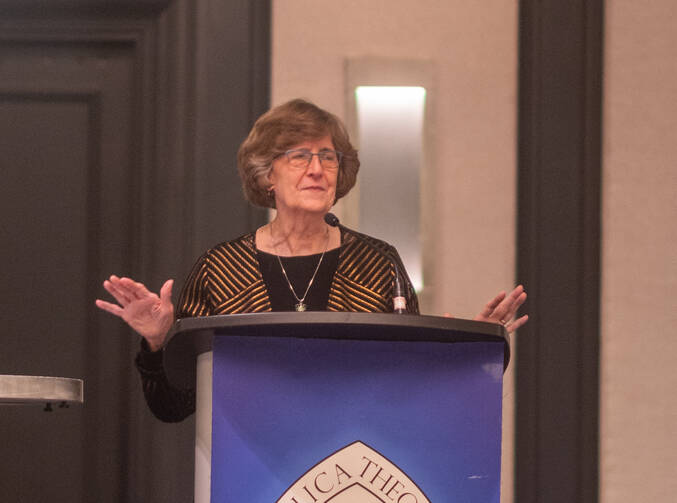Sister Mary Catherine Hilkert honored for ‘incomparable’ contributions to theology by CTSA
The Catholic Theological Society of America honored Mary Catherine Hilkert, O.P., with the John Courtney Murray Award, its highest honor, this past weekend in Baltimore.
Named for the American Jesuit theologian noted for his significant contributions to the Second Vatican Council and his influence on American Catholic theology, the John Courtney Murray Award is given yearly to a scholar for distinguished theological achievement.
In presenting her with the award, outgoing C.T.S.A. president Kristin E. Heyer noted that Sister Hilkert’s contributions to theology remain “incomparable in contemporary Catholic homiletic scholarship, nourished by and shared through decades of lecturing and preaching in Catholic and ecumenical contexts in the United States, Canada, Ireland, the Netherlands, Australia and South Africa.” Dr. Heyer also praised Sister Hilkert’s dedication to underrepresented groups in theology, her scholarship on Edward Schillebeeckx, O.P., and her “research and teaching in fields of fundamental theology, theological anthropology, and feminist theology and spirituality.”
A former president of the C.T.S.A. herself, Sister Hilkert is the author of three books: Naming Grace: Speaking with Authority (1997), Catherine of Siena and the Voices of Women Today (2008) and A Time to Keep Silence and a Time to Speak (2023). She also has published three edited volumes and nearly 70 articles and book chapters. After teaching for 11 years at the Aquinas Institute of Theology in St. Louis, she has taught at the University of Notre Dame for the past two decades. Many of her former doctoral students and colleagues in attendance at the convention joined her on stage after the presentation of the John Courtney Murray Award.
“Cathy Hilkert is an incredibly erudite and generous scholar, the rarest combination among scholars of her caliber,” said Natalia Imperatori-Lee, a professor at Manhattan College in New York City whose doctoral dissertation was directed by Sister Hilkert, in an interview with America. “Her commitment to scholars from underrepresented communities is a legacy the whole academy—and more importantly, the whole church—will benefit from for generations to come.”
The 78th Annual Convention of the C.T.S.A. was held at the Renaissance Baltimore Harborplace Hotel from June 13-16. With a theme of “Social Salvation,” the convention included plenary addresses by Carlos Mendoza-Àlvarez, O.P., of Boston College, Susan Abraham of the Pacific School of Religion (the new vice president of C.T.S.A., she will become president of the society next June), Vincent Miller of the University of Dayton, and Dr. Heyer, who delivered her presidential address Sunday morning. Respondents included Tracy Tiemeier of Loyola Marymount University and Annie Selak of Georgetown University.
After her address, Dr. Heyer, a professor of theology and former director of graduate studies in the Department of Theology at Boston College, officially presented Nancy Pineda-Madrid (who chose this year’s theme) as the new president of C.T.S.A.
Dr. Pineda-Madrid is the T. Marie Chilton Chair of Catholic Theology at Loyola Marymount University in Los Angeles, Calif. In 2018, the C.T.S.A. honored her with the Ann O’Hara Graff Memorial Award, recognizing her scholarship in feminist theology and her work on behalf of women in the church and the broader community.
The election of Catherine E. Clifford on Saturday as the incoming vice president of C.T.S.A. means that the society will soon have its fourth woman president in a row for the first time in history, as Dr. Clifford will follow Dr. Heyer, Dr. Pineda-Madrid and Dr. Abraham in the position. “There is a shift here that’s happening; we’re moving to a very different dynamic in terms of the leadership and conversation partners in Catholic theology, one that I think is long overdue,” said Dr. Pineda-Madrid in an interview with America.
The election of Dr. Clifford also continues another significant trend in the C.T.S.A.: greater diversity along the axes of race and background. “Two of us are women of color—I’m Mexican-American, Susan Abraham is from India—and Cathy Clifford is Canadian,” noted Dr. Pineda-Madrid. “This leadership underscores a more broadly representative global perspective, a perspective which is also evident in the diversity of theologians participating in this convention.”
A professor of historical and systematic theology in the Faculty of Theology, St. Paul University, Ottawa, Dr. Clifford is also the founding director of the Center for Research on Vatican II and 21st Century Catholicism at Saint Paul. She was also a delegate to the Synod on Synodality in Rome last October and will attend the second session in Rome this coming fall.
With 378 registered attendees this year, the C.T.S.A. convention has returned to its pre-Covid numbers. At the same time, Dr. Pineda-Madrid identified new challenges the society faces in terms of membership and support of theology in institutions. “We are in a different place in terms of where theologians are doing their work,” she said. “We used to be able to presume that theology takes place in universities and colleges. But now, there are a number of theologians in the United States, including many younger scholars, who are not on university campuses but are working in other settings.”
“Some theologians who have been professors on university campuses are being asked to move into positions of administrative leadership” as laypeople are stepping into roles previously occupied at many Catholic schools by men and women religious, Dr. Pineda-Madrid noted.
“We, the C.T.S.A., need to broaden our understanding of what is happening to Catholic theologians today. There are many fewer positions on university campuses and many of those that do exist are less stable than they used to be. Trying to figure out what this means for our members and for the church will require imagination and creativity.”






No comments:
Post a Comment